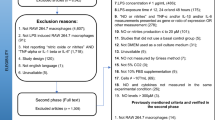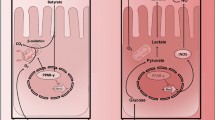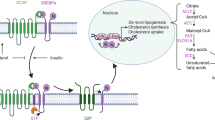Abstract
Obesity increases the risk of colon cancer. Hyperleptinemia is characteristic of obesity and leptin has been reported to be a colonic growth factor. We have examined the involvement of the cyclo-oxygenase (COX) pathways in the proliferation and anti-apoptotic effects of leptin. Leptin stimulated proliferation in HT-29 colon cancer cells: this was unaffected by inhibition of COX-1, COX-2, protein kinase C, or the epidermal growth factor receptor. Leptin did not increase COX-2 mRNA or COX-derived prostaglandin E2 production. Celecoxib induced apoptosis in a COX-independent manner. Leptin reduced both serum starvation- and celecoxib-induced apoptosis. Inhibition of ERK, p38 MAP kinase, and nuclear factor (NF)-κB abolished the growth-promoting and anti-apoptotic effects of leptin. Treatment of HT-29 cells with leptin stimulated phosphorylation of ERK and p38 MAP kinase and nuclear translocation of active NF-κB. We conclude that leptin stimulates colon cancer proliferation via COX-independent pathways and reduces celecoxib-induced apoptosis via ERK, p38 MAP kinase, and NF-κB pathways.








Similar content being viewed by others
References
Baratta M (2002) Leptin—from a signal of adiposity to a hormonal mediator in peripheral tissues. Med Sci Monit 8:RA282–RA292
Somasundar P, Yu AK, Vona-Davis L, McFadden DW (2003) Differential effects of leptin on cancer in vitro. J Surg Res 113:50–55
Attoub S, Noe V, Pirola L, Bruyneel E, Chastre E, Mareel M, Wymann MP, Gespach C (2000) Leptin promotes invasiveness of kidney and colonic epithelial cells via phosphoinositide 3-kinase-, rho-, and rac-dependent signaling pathways. FASEB J 14:2329–2338
Hardwick JC, Van Den Brink GR, Offerhaus GJ, van Deventer SJ, Peppelenbosch MP (2001) Leptin is a growth factor for colonic epithelial cells. Gastroenterology 121:79–90
Hegyi K, Fulop K, Kovacs K, Toth S, Falus A (2004) Leptin-induced signal transduction pathways. Cell Biol Int 28:159–169
Dal Farra C, Zsurger N, Vincent JP, Cupo A (2000) Binding of a pure 125I-monoiodoleptin analog to mouse tissues: a developmental study. Peptides 21:577–587
Giovannucci E, Ascherio A, Rimm EB, Colditz GA, Stampfer MJ, Willett WC (1995) Physical activity, obesity, and risk for colon cancer and adenoma in men. Ann Intern Med 122:327–324
Pan SY, Johnson KC, Ugnat AM, Wen SW, Mao Y (2004) Association of obesity and cancer risk in Canada. Am J Epidemiol 159:259–268
Stattin P, Lukanova A, Biessy C, Soderberg S, Palmqvist R, Kaaks R, Olsson T, Jellum E (2004) Obesity and colon cancer: Does leptin provide a link? Int J Cancer 109:149–152
Yao M, Lam EC, Kelly CR, Zhou W, Wolfe MM (2004) Cyclooxygenase-2 selective inhibition with NS-398 suppresses proliferation and invasiveness and delays liver metastasis in colorectal cancer. Br J Cancer 90:712–719
Mann JR, Dubois RN (2004) Cyclooxygenase-2 and gastrointestinal cancer. Cancer J 10:145–152
Kismet K, Akay MT, Abbasoglu O, Ercan A (2004) Celecoxib: a potent cyclooxygenase-2 inhibitor in cancer prevention. Cancer Detect Prev 28:127–142
Tuynman JB, Peppelenbosch MP, Richel DJ (2004) COX-2 inhibition as a tool to treat and prevent colorectal cancer. Crit Rev Oncol Hematol 52:81–101
Yao M, Song DH, Rana B, Wolfe MM (2002) COX-2 selective inhibition reverses the trophic properties of gastrin in colorectal cancer. Br J Cancer 87:574–579
Luo JC, Shin VY, Yang YH, Wu WK, Ye YN, So WH, Chang FY, Cho CH (2005) Tumor necrosis factor-α stimulates gastric epithelial cell proliferation. Am J Physiol Gastrointest Liver Physiol 288:G32–G38
Souza RF, Shewmake K, Pearson S, Sarosi GA Jr, Feagins LA, Ramirez RD, Terada LS, Spechler SJ (2004) Acid increases proliferation via ERK and p38 MAPK-mediated increases in cyclooxygenase-2 in Barrett’s adenocarcinoma cells. Am J Physiol Gastrointest Liver Physiol 287:G743–G748
Hawcroft G, Ko CW, Hull MA (2006) Prostaglandin E(2)-EP4 receptor signalling promotes tumorigenic behaviour of HT-29 human colorectal cancer cells. Oncogene (epub ahead of print, 20 Nov 2006 doi, 10.10138/sj.onc.1210113)
Yamazaki R, Kusunoki N, Matsuzaki T, Hashimoto S, Kawai S (2002) Selective cyclooxygenase-2 inhibitors show a differential ability to inhibit proliferation and induce apoptosis of colon adenocarcinoma cells. FEBS Lett 531:278–284
Grosch S, Tegeder I, Niederberger E, Brautigam L, Geisslinger G (2001) COX-2 independent induction of cell cycle arrest and apoptosis in colon cancer cells by the selective COX-2 inhibitor celecoxib. FASEB J 15:2742–2744
Solomon SD, McMurray JJ, Pfeffer MA, Wittes J, Fowler R, Finn P, Anderson WF, Zauber A, Hawk E, Bertagnolli M (2005) Cardiovascular risk associated with celecoxib in a clinical trial for colorectal adenoma prevention. N Engl J Med 352:1071–1080
Saxena NK, Titus MA, Ding X, Floyd J, Srinivasan S, Sitaraman SV, Anania FA (2004) Leptin as a novel profibrogenic cytokine in hepatic stellate cells: mitogenesis and inhibition of apoptosis mediated by extracellular regulated kinase (Erk) and Akt phosphorylation. FASEB J 18:1612–1614
van den Brink GR, O’Toole T, Hardwick JC, van den Boogaardt DE, Versteeg HH, van Deventer SJ, Peppelenbosch MP (2000) Leptin signaling in human peripheral blood mononuclear cells, activation of p38 and p42/44 mitogen-activated protein (MAP) kinase and p70 S6 kinase. Mol Cell Biol Res Commun 4:144–150
Bjorbaek C, Buchholz RM, Davis SM, Bates SH, Pierroz DD, Gu H, Neel BG, Myers MG Jr, Flier JS (2001) Divergent roles of SHP-2 in ERK activation by leptin receptors. J Biol Chem 276:4747–4755
Dreyer MG, Juge-Aubry CE, Gabay C, Lang U, Rohner-Jeanrenaud F, Dayer JM, Meier CA (2003) Leptin activates the promoter of the interleukin-1 receptor antagonist through p42/44 mitogen-activated protein kinase and a composite nuclear factor kappa B/PU.1 binding site. Biochem J 370:591–599
Kim GS, Hong JS, Kim SW, Koh JM, An CS, Choi JY, Cheng SL (2003) Leptin induces apoptosis via ERK/cPLA2/cytochrome c pathway in human bone marrow stromal cells. J Biol Chem 278:21920–21929
Maroni P, Bendinelli P, Piccoletti R (2003) Early intracellular events induced by in vivo leptin treatment in mouse skeletal muscle. Mol Cell Endocrinol 201:109–121
Thamilselvan V, Li W, Sumpio BE, Basson MD (2002) Sphingosine-1-phosphate stimulates human Caco-2 intestinal epithelial proliferation via p38 activation and activates ERK by an independent mechanism. In Vitro Cell Dev Biol Anim 38:246–253
Rouet-Benzineb P, Aparicio T, Guilmeau S, Pouzet C, Descatoire V, Buyse M, Bado A (2004) Leptin counteracts sodium butyrate-induced apoptosis in human colon cancer HT-29 cells via NF-kappaB signaling. J Biol Chem 279:16495–16502
Colucci R, Blandizzi C, Tanini M, Vassalle C, Breschi MC, Tacca MD (2005) Gastrin promotes human colon cancer cell growth via CCK-2 receptor-mediated cyclooxygenase-2 induction and prostaglandin E(2) production. Br J Pharmacol 144:338–348
Todisco A, Ramamoorthy S, Witham T, Pausawasdi N, Srinivasan S, Dickinson CJ, Askari FK, Krametter D (2001) Molecular mechanisms for the antiapoptotic action of gastrin. Am J Physiol Gastrointest Liver Physiol 280:G298–G307
Ogunwobi OO, Beales ILP (2006) Adiponectin stimulates proliferation and cytokine secretion in colonic epithelial cells. Regul Peptides 134:105–113
Ogunwobi O, Mutungi G, Beales IL (2006) Leptin stimulates proliferation and inhibits apoptosis in Barrett’s esophageal adenocarcinoma cells by cyclooxygenase-2-dependent, prostaglandin-E2-mediated transactivation of the epidermal growth factor receptor and c-Jun NH2-terminal kinase activation. Endocrinology 147:4505–4516
Beales IL, Ogunwobi O (2006) Glycine-extended gastrin inhibits apoptosis in colon cancer cells via separate activation of Akt and JNK pathways. Mol Cell Endocrinol 247:140–149
Cory AH, Owen TC, Barltrop JA, Cory JG (1991) Use of an aqueous soluble tetrazolium/formazan assay for cell growth assays in culture. Cancer Commun 3:207–212
Beales IL (2004) Gastrin and interleukin-1beta stimulate growth factor secretion from cultured rabbit gastric parietal cells. Life Sci 75:2983–2995
Ogunwobi OO, Beales IL (2006) Glycine-extended gastrin stimulates proliferation and inhibits apoptosis in colon cancer cells via cyclo-oxygenase-independent pathways. Regul Pept 134:1–8
Souza RF, Shewmake K, Beer DG, Cryer B, Spechler SJ (2000) Selective inhibition of cyclooxygenase-2 suppresses growth and induces apoptosis in human esophageal adenocarcinoma cells. Cancer Res 60:5767–5772
Ropeleski MJ, Riehm J, Baer KA, Musch MW, Chang EB (2005) Anti-apoptotic effects of L-glutamine-mediated transcriptional modulation of the heat shock protein 72 during heat shock. Gastroenterology 129:170–184
Hsi LC, Baek SJ, Eling TE (2000) Lack of cyclooxygenase-2 activity in HT-29 human colorectal carcinoma cells. Exp Cell Res 256:563–570
Sharma RA, Gescher A, Plastaras JP, Leuratti C, Singh R, Gallacher-Horley B, Offord E, Marnett LJ, Steward WP, Plummer SM (2001) Cyclooxygenase-2, malondialdehyde and pyrimidopurinone adducts of deoxyguanosine in human colon cells. Carcinogenesis 22:1557–1560
Yang WL, Frucht H (2000) Cholinergic receptor up-regulates COX-2 expression and prostaglandin E(2) production in colon cancer cells. Carcinogenesis 21:1789–1793
Fujiwara Y, Higuchi K, Tominaga K, Watanabe T, Oshitani N, Arakawa T (2005) Functional oesophageal epithelial defense against acid. Inflammopharmacology 13:1–13
Ukegawa JI, Takeuchi Y, Kusayanagi S, Mitamura K (2003) Growth-promoting effect of muscarinic acetylcholine receptors in colon cancer cells. J Cancer Res Clin Oncol 129:272–278
Pai R, Soreghan B, Szabo IL, Pavelka M, Baatar D, Tarnawski AS (2002) Prostaglandin E2 transactivates EGF receptor: a novel mechanism for promoting colon cancer growth and gastrointestinal hypertrophy. Nat Med 8:289–293
Choy H, Milas L (2003) Enhancing radiotherapy with cyclooxygenase-2 enzyme inhibitors: A rational advance? J Natl Cancer Inst 95:1440–1452
Sun Y, Sinicrope FA (2005) Selective inhibitors of MEK1/ERK44/42 and p38 mitogen-activated protein kinases potentiate apoptosis induction by sulindac sulfide in human colon carcinoma cells. Mol Cancer Ther 4:51–59
Nishihara H, Hwang M, Kizaka-Kondoh S, Eckmann L, Insel PA (2004) Cyclic AMP promotes cAMP-responsive element-binding protein-dependent induction of cellular inhibitor of apoptosis protein-2 and suppresses apoptosis of colon cancer cells through ERK1/2 and p38 MAPK. J Biol Chem 279:26176–26183
Chan UP, Lee JF, Wang SH, Leung KL, Chen GG (2003) Induction of colon cancer cell death by 7-hydroxystaurosporine (UCN-01) is associated with increased p38 MAPK and decreased Bcl-xL. Anticancer Drugs 14:761–766
Lee EJ, Park HG, Kang HS (2003) Sodium salicylate induces apoptosis in HCT116 colorectal cancer cells through activation of p38MAPK. Int J Oncol 23:503–508
Wang CY, Mayo MW, Baldwin AS Jr (1996) TNF- and cancer therapy-induced apoptosis: potentiation by inhibition ofNF-kappaB. Science 274:784–787
Ghosh S, May MJ, Kopp EB (1998) NF-kappa B and Rel proteins: evolutionarily conserved mediators of immune responses. Annu Rev Immunol 16:225–260
Reuther-Madrid JY, Kashatus D, Chen S, Li X, Westwick J, Davis RJ, Earp HS, Wang CY, Baldwin AS Jr (2002) The p65/RelA subunit of NF-kappaB suppresses the sustained, antiapoptotic activity of Jun kinase induced by tumor necrosis factor. Mol Cell Biol 22:8175–8183
Garrouste F, Remacle-Bonnet M, Fauriat C, Marvaldi J, Luis J, Pommier G (2002) Prevention of cytokine-induced apoptosis by insulin-like growth factor-I is independent of cell adhesion molecules in HT29-D4 colon carcinoma cells-evidence for a NF-kappaB-dependent survival mechanism. Cell Death Differ 9:768–769
Acknowledgments
This work was funded by the Norfolk andNorwich University Hospital Bicentenary Trust in the form of a Research Studentship to Dr. Ogunwobi. Further financial support was provided by The Royal Society, The Peel Medical Research Trust, The Mason Medical Research Foundation, The Institute of Biomedical Science, NHS Research and Development Funding, and the Norfolk and Norwich University Hospital Inflammatory Bowel Disease Research Fund.
Author information
Authors and Affiliations
Corresponding author
Rights and permissions
About this article
Cite this article
Ogunwobi, O.O., Beales, I.L.P. Cyclo-oxygenase-Independent Inhibition of Apoptosis and Stimulation of Proliferation by Leptin in Human Colon Cancer Cells. Dig Dis Sci 52, 1934–1945 (2007). https://doi.org/10.1007/s10620-007-9784-6
Received:
Accepted:
Published:
Issue Date:
DOI: https://doi.org/10.1007/s10620-007-9784-6




